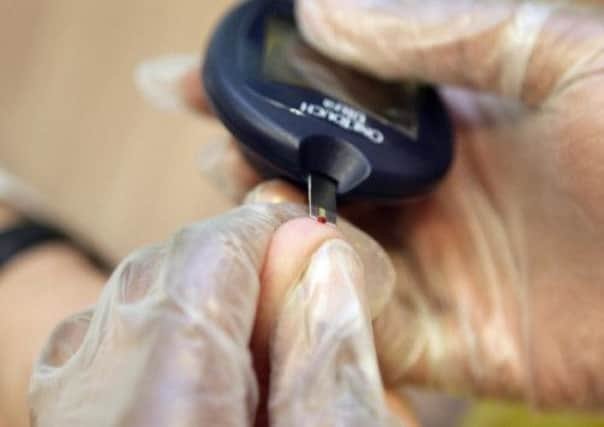NHS failure to limit diabetes ‘risks disaster’


Diabetes UK said the number of those failing to manage the condition properly could lead to a “public health disaster” unless the Government steps in to support people. Without proper control, diabetes can lead to serious complications including kidney failure and stroke.
The charity’s analysis of National Diabetes Audit figures showed that 19.9 per cent of people with Type 1 or Type 2 diabetes in England meet health targets for blood glucose, blood pressure and cholesterol levels, with the number even lower in Wales at 18.5 per cent. Out of those in England with Type 1 diabetes, which requires the daily administration of insulin, only 11.4 per cent are meeting the recommended levels.
Advertisement
Hide AdAdvertisement
Hide AdBarbara Young, chief executive of Diabetes UK, said: “Given that diabetes is serious and can lead to early death if not supported to manage their condition, it is extremely worrying that so few people have it under control.
“When you consider that there are now three million people diagnosed with diabetes and this number is rising quickly, the fact that so many of them do not have good control over their diabetes means that unless something changes we face a public health disaster.
“Whether these people have high blood glucose levels, blood pressure or cholesterol, they are at increased risk of diabetes-related complications such as heart disease, amputation, and stroke.”
Baroness Young accused the healthcare system of being “all too often not good enough”, and said that people with diabetes needed self-management support programmes, along with ongoing medical support and education if they were to avoid complications and reduce the risk of early death.
Advertisement
Hide AdAdvertisement
Hide AdDiabetes UK is calling on the Government to increase the number of people with diabetes getting the nine annual health checks recommended by the National Institute for Clinical Excellence (Nice), and to hold poor-performing areas of England and Wales to account.
“It is time to break the cycle of poor diabetes management and poor health outcomes,” said Baroness Young.
“By investing in the healthcare and ongoing structured education to enable people with diabetes to manage their condition, we can ensure they have the best possible chance of a long and healthy life.
“But this will not happen by itself. We need local services to take this seriously and to put in place the care that all people with diabetes deserve and we need the Government to finally make diabetes a priority and insist that everyone with the condition gets good quality healthcare.”
Advertisement
Hide AdAdvertisement
Hide AdSome 24,000 people with diabetes die early every year in England and Wales, according to Diabetes UK. The NHS spends about £10bn a year on diabetes, some 10 per cent of its entire budget, the charity added, with 80 per cent of that going on treating complications that could have been prevented in many cases.
Yesterday, medics at Sheffield University announced they planned to launch a “pioneering investigation” to discover how diabetes affects heart and brain function in a bid to help the soaring number of people living with the disease.
The university’s medical school and Sheffield Teaching Hospitals NHS Foundation Trust will use a new £1.2m MRI scanner to examine the effect of the condition.
Prof Iain Wilkinson, who is leading the project, said: “Diabetes has been and is today a health issue of severe social and financial importance.
Advertisement
Hide AdAdvertisement
Hide Ad“By applying developments of the new technology to heart and brain imaging in a novel way, we aim to provide greater insights into various problems associated with diabetes that we currently know too little about.”